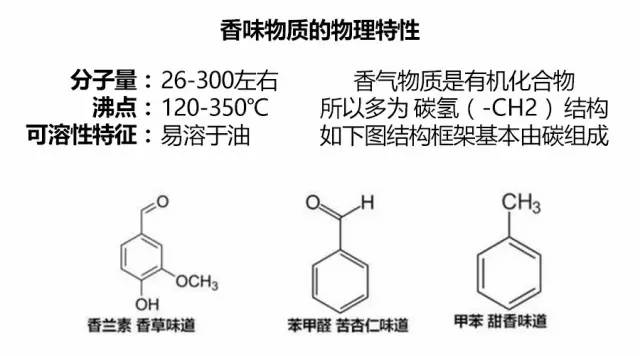Why can you smell coffee? From a chemical point of view!
Follow the caf é (Wechat official account vdailycom) and found that Beautiful Cafe opened a small shop of its own.
The composition of the taste of coffee?
Coffee is one of the most difficult foods to maintain a fixed quality. in essence, the water content in a cup of coffee reaches 98-99%, so only less than 2% of the substances actually affect the taste and aroma of the coffee. So why is this 2% of the substance so powerful that it can affect the taste of coffee?
The reason why it is most difficult to maintain a fixed quality is that from the beginning of coffee roasting, it is already a very variable process. If the coffee produced in this roasting process is very good, it is difficult to copy it completely.
And once we have finished brewing the coffee, we expect the coffee flavor, aroma failed to present, we will not have any chance to reverse the remedy.
If we can understand the aroma and flavor composition of coffee, it will be very helpful for us to stabilize coffee production in the future.
However, it is a pity that at this stage, there is no specialized organization in China that is willing to specialize in coffee flavor chemistry. After all, it has nothing to do with interests.
After flipping through some literature and books, Hack also sorted out the following article.

What's the aroma?
Like many plants, more than 60% of the substances in raw coffee beans are carbohydrates, the fat content is about 10-15%, while the protein content is less than 10%, which is somewhat different from other plants, which should be caffeine, chlorogenic acid, fenugreek base and so on.
But no matter how hard you put your heart into each step, from seed to cup, planting, baking, extraction, the total amount of soluble matter in a cup of coffee will not exceed 2%.
But the funny thing is, normally, as long as the organic acid content in a cup of coffee reaches 0.4%, people can easily and obviously feel the acidity of the coffee. The proportion of organic acids in coffee can easily exceed 0.4%, but other ingredients in coffee can be masked, making it impossible to feel more.
In fact, people's sense of taste, apart from the discussion of smell, can only be perceived as sour, sweet, bitter, salty and fresh, while 0.01% of the ingredients in a cup of coffee are enough to make people feel bitter, and 0.1% is enough to make us aware of sour taste.
Then why can coffee make us feel all kinds of complex and varied fragrance? On the one hand, our sense of smell plays a role, on the other hand, it is the role of coffee aroma substances.
Even less than 0.1% of the aroma substances can fully stimulate our olfactory senses!
The reason why we can feel so much flavor is because of the existence of aroma substances. But these aroma substances have one thing in common-they are volatile.
To be volatile, these coffee aroma substances, these flavor substances, the molecular weight should be relatively small, the molecular weight can be understood by our concept of weight, the larger the molecular weight, the heavier the aroma molecule. Imagine that we want this molecule to float in the air. It should be very light.
If the molecule is soluble in water, it is more likely to become a component of the flavor, because the aroma molecule is an organic compound, and most organic compounds are soluble in oil. It will be easier to distinguish.
The characteristics of aroma substances can be roughly classified as shown below.

There are corresponding rules for aroma substances:
Volatility is closely related to molecular weight. The larger the molecular weight is, the smaller the volatility is and the greater the boiling point is. At room temperature, maintaining liquid / solid and a small amount of volatile substances are the aroma substances. As the temperature increases, these aroma substances will accelerate its molecular volatilization.
Aroma compounds with low molecular weight:
Mainly reflected in the low carbon content and low total molecular weight.
Highly volatile
The fragrance is persistent and short.
Give priority to pungent taste
Aroma compounds with high molecular weight:
It is mainly reflected in high carbon content and high total molecular weight.
The volatility is relatively low
The fragrance lasts for a long time
The taste is mostly pleasant.
So what is the difference between aroma substances and flavor (taste) substances?
If we want to brew a cup of coffee, it is important if we can master which molecules are soluble in water and which are more soluble in oil.
But without exception, the molecules perceived by our sensory receptors are all small molecular compounds, so the molecular weight of flavor substances is not much.

But unlike aroma substances, it does not need to be volatile, because taste senses come from direct contact with food, that is, these molecular compounds communicate with taste receptors on the tongue.
So even if the molecular weight is much larger than the aroma substances, it will not affect the perception. Most of the molecular compounds of flavor substances are hydrophilic and easily soluble in water.
Obviously! In contrast to the perception of the tongue, the nose needs to smell the aroma of coffee, which cannot be transmitted without volatile transmission to the nasal cavity.
At this point, it is necessary that these chemical knowledge points have been enough for everyone to digest.
But note that these are just some common rules, and the performance of many substances in chemistry is not so simple. Small molecular weight does not necessarily volatilize, volatilization does not necessarily have flavor. The melting point mentioned above is not necessarily linked to the molecular weight.
All sorts of things in the chemical world still need to be studied assiduously.
Important Notice :
前街咖啡 FrontStreet Coffee has moved to new addredd:
FrontStreet Coffee Address: 315,Donghua East Road,GuangZhou
Tel:020 38364473
- Prev

About coffee aroma / defective smell
The defective odor Aromatic Taint is golden, and so is coffee. In addition to the natural and fresh aroma of flowers and fruits, sweet caramel, coffee will also have a bad smell, which is what we are going to talk about today. Before a cup of coffee is presented to guests, it often goes through many processes: picking, processing, transportation and storage of raw beans. Due to the complexity of production chain
- Next

The old Chinese medicine doctor talks about people who drink coffee for a long time, you have to watch it!
Professional barista communication please pay attention to coffee workshop (Wechat official account cafe_style) coffee is an imported product, when Western culture collides with traditional Chinese medicine culture, let's see how traditional Chinese medicine feels the pulse of coffee! The coffee bean is taken from the fruit of the coffee tree. It is red and red in color, enters the heart, is bitter, and merges into the path of the large intestine. The taste is bitter and bitter, fried and scorched. The taste of glycol has nourishing and relaxing effects.
Related
- Beginners will see the "Coffee pull flower" guide!
- What is the difference between ice blog purified milk and ordinary milk coffee?
- Why is the Philippines the largest producer of crops in Liberia?
- For coffee extraction, should the fine powder be retained?
- How does extracted espresso fill pressed powder? How much strength does it take to press the powder?
- How to make jasmine cold extract coffee? Is the jasmine + latte good?
- Will this little toy really make the coffee taste better? How does Lily Drip affect coffee extraction?
- Will the action of slapping the filter cup also affect coffee extraction?
- What's the difference between powder-to-water ratio and powder-to-liquid ratio?
- What is the Ethiopian local species? What does it have to do with Heirloom native species?

